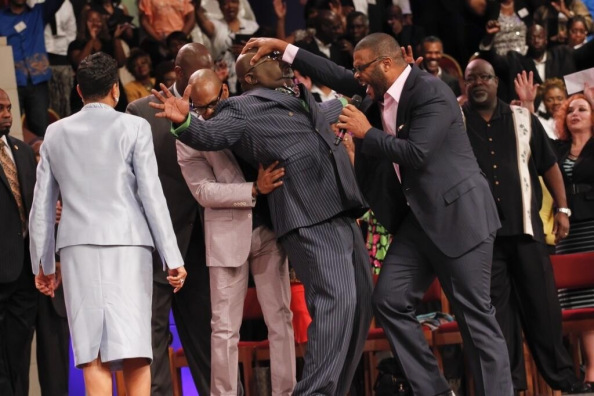
I finally got the strength to watch the viral video of Tyler Perry and Bishop Jakes recently. I then had conversations about it with Christians and non-Christians in coffee shops and on phone conversations. While usually I can write paragraphs and paragraphs of analyses, my thoughts about what I saw and what I felt could only be expressed through a list.
The following are ten thoughts (some are concerns and others are critiques) about not only the video but also the evangelical church in general. To make full sense of it, I recommend you take a look at the video first. My perspective is from one who was "raised in the church all my life," has taught religion, is a philosopher who happens to be Christian, is a person who was ordained in the church, is an out-the-box yet critical thinker, and is a person who is trying to make sense of the church's present state and also hope for that thing back that drew me to the church in the first place.
1. Unfortunately, power and success equates to "anointing" and gives certain people more access than others in evangelical culture. This is wrong!
2. If you are a giver, there is no need to announce it. Just as it is the case that when you are humble, there is no need to announce it.
3. We must not imagine that to be a "giver" is to only give to religious causes. In truth it seems that giving money to other "secular" or at-least "faith-based" causes would be more productive, effective, and wise than giving large "sacrificial seeds" to the church.
4. I believe that creating random numbers as a challenge in giving is manipulative and ridiculous. It's foolish to say that because it is 10:00, God wants you to give 10 million dollars. I wish we were more critical in this regard. I also wish that "offering callers" were less deceptive.
5. The audience' response to Tyler Perry and Bishop Jakes is psychologically intriguing. It is Bishop Jakes who is receiving the million dollars and yet the audience is rejoicing as if they are Bishop Jakes. I am not suggesting that the audience should not be happy for him, but it seems they are rejoicing over the idea that they could be next in line to receive a blessing from God. However, "hoping" it will happen to you is quite different from "it will happen to you." The reality is that the church audience members are much less likely to become millionaires. To make them believe that they will be if only they are faithful and giving is dangerous and false.
6. This idea of God extending "favor" to people is also dangerous. Favor indicates the reality of "favorites." If God has favorites, this depicts God as bias and unfair. I would hate to believe that a loving God is also an unfair God. While people may hold these characteristics, it conflicts with the idea of a good God.
7. Evangelicals must become more of a friend to the poor. What I mean by this is to ask congregants to write blank checks or checks for $100,000 in a sea of poor and middle class people is not only irresponsible but it is to turn a blind eye to the current economic state of its members. To become a friend to the poor is to acknowledge and to be sensitive to the economic state of its congregants. To help the poor is not to tell them that giving is a way out. Rather it is to teach them to save. It's to not only give them money seminars, but networking opportunities (particularly with the rich congregants) as well as skill seminars and higher education opportunities in order to give them a greater chance at economic stability. To ask poor and middle class people to "sacrifice" their hard-earned money to build a church when they are also currently sacrificing to survive is evil.
8. If a church is the best looking and biggest site in an urban neighborhood I find that problematic. While for some it may suggest that we have put God first or it becomes a solace for poor people, I disagree. I believe it shows an otherworldliness theology and a neglect for the people and conditions around it. I do not believe God's house needs to be "the most immaculate" particularly if God dwells in the hearts and minds of the poor and middle class congregants, then God also lives in their houses. So why do we neglect to rebuild or revitalize their houses with the same priority?
9. Anthea Butler wrote an article this summer where she makes a distinction between the God she serves and the racist God that conservatives have created. In the same vein, I'm beginning to think evangelicals are serving a totally different God than the one I fell in love with at 6-years-old, the one I dedicated three years of seminary to studying, and the one I made a commitment to during my AME ordination over ten years ago. Call me rouge or call me crazy, but I just think that I serve a totally different God than the money focused one I saw on the viral video and hear about in church rhetoric. My God is not capitalistic, sexist, homophobic, racist, etc. I'm so sorry to hear that yours is.
10. I predict the "culture of church" will be the death of the church. Until the church gets more focused on the teachings of Jesus and less focused on a manipulative concept of success, emotionalism, and dogmatism; it will always look like foolishness to outsiders and feel "only" like church to insiders.
